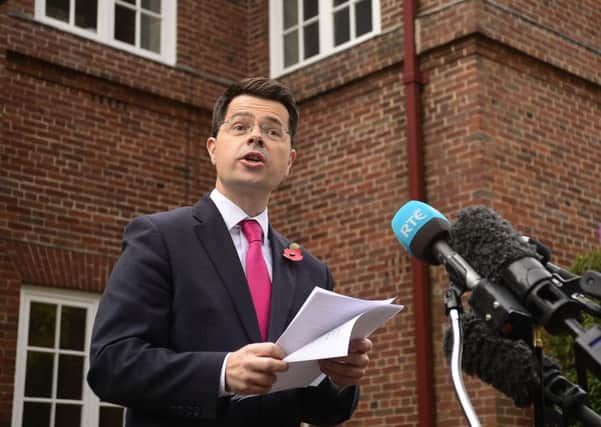Brokenshire sets new deadline, threatening direct rule budget


Mr Brokenshire, who has faced mounting criticism for his patience with the parties over eight months of negotiations, said that he would now introduce a Stormont budget at Westminster in the middle of this month.
However, he made clear that he was prepared to withdraw that key financial legislation if the two parties could get a budget through Stormont by the end of this month.
Advertisement
Hide AdAdvertisement
Hide AdThere had been suggestions that Mr Brokenshire would make a statement to the Commons yesterday about the situation. In the event, he remained in Belfast and addressed the media rather than MPs outside the NIO’s Stormont House base in Belfast.
Although he said that “important progress” has been made in the talks, he said that “it has not yet been possible for the parties to reach agreement” but that the talks would continue.
That meant, he said, that he would not be able to bring forward the legislation to allow for an Executive to be formed – something necessary because the original statutory deadline in March was missed.
Mr Brokenshire warned that there would therefore be “consequences”, but then went on to effectively give the parties still more time to keep talking.
Advertisement
Hide AdAdvertisement
Hide Ad“It is responsibility of the parties to form an Executive to take forward its own budget, but it is now very unlikely that an Executive will be in place within a timetable to pass a budget by the end of November, which is the point at which we and the Northern Ireland Civil Service assess that Northern Ireland will begin to run out of resources.
“No government could simply stand by and allow that to happen. I am, therefore, now taking forward the necessary steps that would enable a Budget Bill to be introduced at Westminster at the appropriate moment in order to protect the delivery of public services in Northern Ireland.”
Mr Brokenshire said that he expected the bill to be considered by MPs after next week’s recess, meaning the week of November 13.
“Subject of course to Parliamentary approval, the effect of this would be to give the Northern Ireland Civil Service certainty to plan for the rest of this financial year by giving the necessary legal authority to spend to existing plans.”
Advertisement
Hide AdAdvertisement
Hide AdMr Brokenshire said that such legislation “is not a barrier to continued political negotiations” and added that “however unlikely, should an Executive be formed speedily enough and a means could be created to provide an exceptional procedure to enable the budget to be passed by the end of November I would be prepared to withdraw the Budget Bill in order for the Assembly to legislate for itself.”
Mr Brokenshire also again hinted that he may cut MLA pay, saying that he would take “independent advice” on the issue, but gave no definitive timetable on such a course of action.
Speaking for the DUP, Gregory Campbell denounced Sinn Fein’s “shopping list of preconditions” for re-entering power-sharing.
The East Londonderry MP accused Gerry Adams’ party of blocking progress for 10 months and said that for it to then complain about the speed of progress “is nothing short of rank hypocrisy”.
Advertisement
Hide AdAdvertisement
Hide AdHe added: “The DUP stands ready to form an Executive today. We want devolution. Arlene Foster has led our talks team and is rightly frustrated that government is being held back by a narrow political agenda. We received an overwhelming mandate to ensure any deal was fair. That mandate has to be respected, just as we respect the mandate of others.”
Sinn Fein’s Michelle O’Neill admitted that “endless talks without conclusion are not sustainable”, but, alluding to the key stumbling block of an Irish language act, she insisted: “The issue of rights is not going to go away. The DUP and British government know this. These rights must be satisfactorily dealt with.”
Referring to Mr Brokenshire’s intention to bring forward a budget at Westminster, the Republic’s foreign minister, Simon Coveney, said: “I acknowledge that this step would be taken by secretary of state with the utmost reluctance and at the latest possible juncture in accordance with the British government’s responsibility to ensure good governance in Northern Ireland.
“Both governments share the view that it is regrettable and deeply concerning that, eight months after the last Assembly election, a power-sharing Executive is not in place to make the necessary decisions, including on budgetary issues, for Northern Ireland.”
Advertisement
Hide AdAdvertisement
Hide AdUUP leader Robin Swann accused Sinn Fein of “abuse of political process” and added: “The reality is that Sinn Fein and the DUP couldn’t agree in government, and they can’t agree outside government either.”
SDLP leader Colum Eastwood said that the two big parties’ failure to strike a deal “is delivering British direct rule to Northern Ireland”.
But one MLA was positive about developments. TUV leader Jim Allister welcomed what he described as the “good news” that the attempts to restore the “unworkable Stormont Executive” had failed and called for fresh thinking about either devolution or an integrationist approach, moving Northern Ireland closer to the rest of the UK.